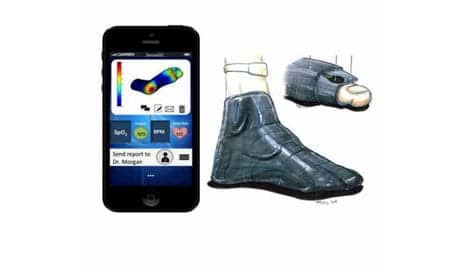
SenseGO, developed by students at the Hebrew University’s BioDesign program, pairs pressure-sensing socks with smartphones to reduce foot ulcers in diabetic patients. (Photo courtesy of The Hebrew University of Jerusalem)
A team of university students has developed SenseGO—comprised of pressure-sensing socks paired with a smartphone app—that is engineered to warn diabetic patients about developing foot ulcers.
The students are from the BioDesign: Medical Innovation program, created by The Hebrew University of Jerusalem and its affiliated Hadassah Medical Center, according to a media release from The Hebrew University of Jerusalem.
According to the release, diabetic neuropathy, and diabetic foot ulcers, is a leading cause of amputation. However, foot ulcers are usually only diagnosed after they occur, meaning that patients require healing time—which can dramatically increase healthcare costs.
“This is a significant medical problem that affects the lives of millions. We thought there must be a way to avoid these wounds altogether,” says Danny Bavli, the group’s lead engineer, in the release.
Bavli, together with Sagi Frishman and Hadassah Medical Center orthopedic surgeon Dr David Morgenstern, led the team that created the SenseGO.
SenseGO features a machine-washable sock containing dozens of micro-fabricated pressure sensors. These sensors register any changes in pressure due to incorrect posture, anatomical deformation, or ill-fitting shoes as electrical signals, which are relayed to a smartphone app. The app then informs the patient of the developing risk of a pressure ulcer.
Yaakov Nahmias, PhD, BioDesign program director, states in the release that, “This is a classic mobile health approach. By giving patients and their families the tools they need to prevent the development of ulcers, we can dramatically reduce healthcare costs related to diabetes.”
[Source(s): The Hebrew University of Jerusalem, EurekAlert]





